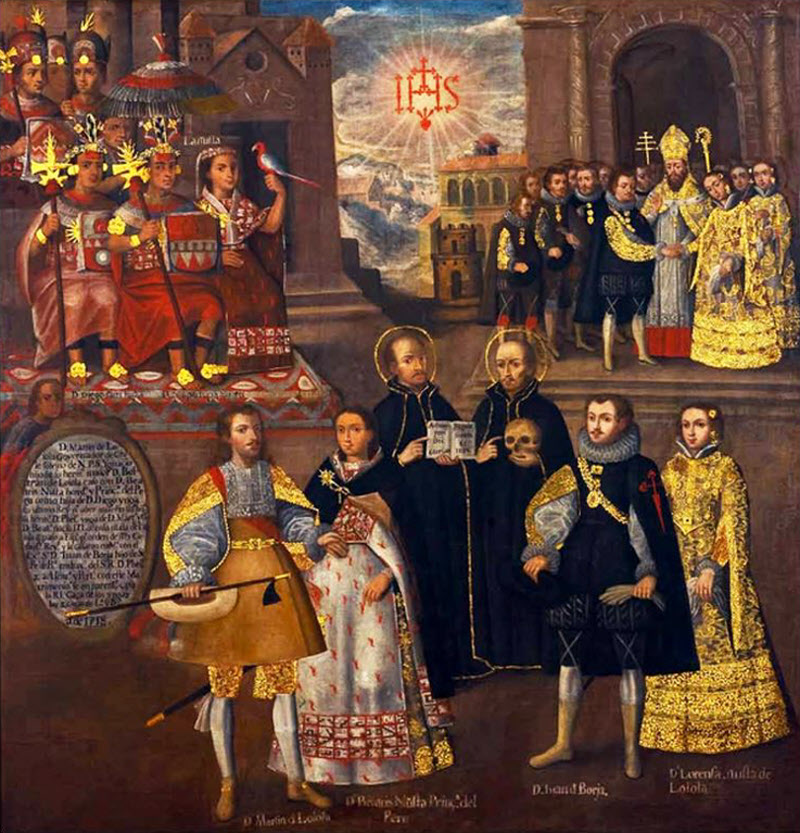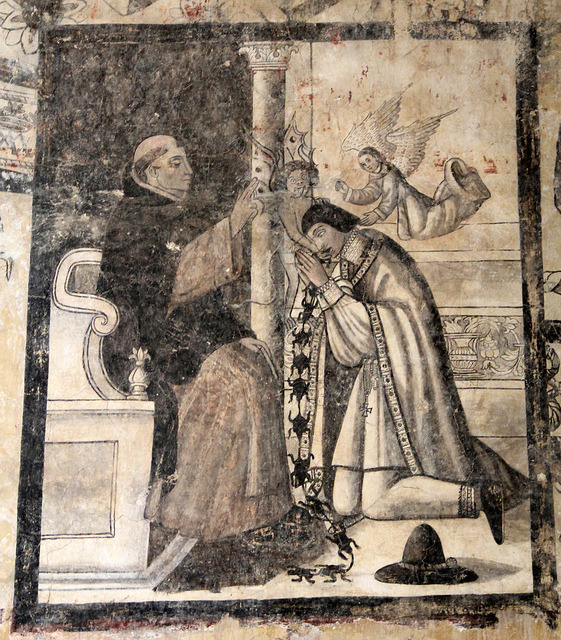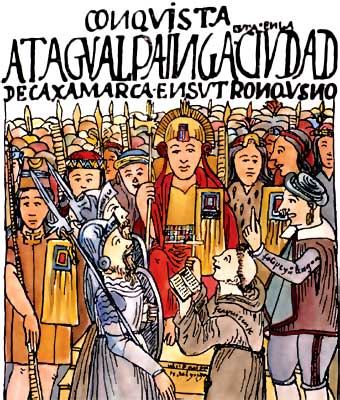
Felipe Huaman Poma de Ayala also known as Guamán Poma or Wamán Poma, was a Quechua nobleman known for chronicling and denouncing the ill treatment of the natives of the Andes by the Spanish after their conquest.
Moctezuma was the ninth tlatoani or ruler of Tenochtitlan, reigning from 1502 to 1520. The first contact between indigenous civilizations of Mesoamerica and Europeans took place during his reign, and he was killed during the initial stages of the Spanish conquest of Mexico, when Conquistador Hernán Cortés and his men fought to escape from the Aztec capital Tenochtitlan
Túpac Amaru or Thupa Amaro was the last indigenous monarch of the Neo-Inca State, remnants of the Inca Empire in Vilcabamba, Peru. He was executed by the Spanish
King Ferdinand and Queen Isabella. Reigning monarchs during Spain's expansion into the New World, they financed Columbus's voyage in 1492 that led to his momentous discovery. Known as the "Catholic King and Queen"
Malinali Tenepal. Born around 1500 to noble parents, she was sold into slavery to Mayan traders who in turn sold her to the Spanish invaders. Her facility with languages brought her to the attention of Cortes, who used her as a translator and confidante. Named Malinali for the Nahua "goddess of grass," she was known to the Spanish as Dona Marina and to the Aztecs as La Malinche or Captain's Woman. She was the mother of Cortes' first son, Martin.
Juan Diez de Betanzos wrote one of the most important sources on the conquest of the Incan civilization: Narrative of the Incas. He based this account of the Incas on the testimony of his wife, who had been previously married to Incan King Atahualpa as well as conducting interviews of Incans who had taken part in the Battle of Cajamarca or been in Atahualpa's camp.
Herná Cortes. Spanish conquistador who led the expedition that caused the ownfall of the Aztec empire and brought large portions of Mexico under Spanish rule.
Gonzalo Jiménez de Quezada, was a Spanish explorer and conquistador in Colombia. He explored the northern part of South America.

Ferdinand Magellan Spanish: Fernando de Magallanes was a Portuguese explorer who organized the Spanish expedition to the East Indies from 1519 to 1522, resulting in the first circumnavigation of the Earth.
Christopher Columbus Spanish Cristobal Colon. Under the auspices of the Catholic Monarchs of Spain, he completed four voyages across the Atlantic Ocean. Those voyages, and his efforts to establish permanent settlements on the island of Hispaniola, initiated the Spanish colonization of the New World.

Artisans / artesanos
Encomenderos / encomenderos
Intellectuals / letrados
Merchants / comerciantes
Mestizos
Mulattoes
Fray Bartolomé de las Casas was a 16th-century Spanish historian, social reformer and Dominican friar. He became the first resident Bishop of Chiapas, and the first officially appointed "Protector of the Indians". His extensive writings, the most famous being A Short Account of the Destruction of the Indies and Historia de Las Indias, chronicle the first decades of colonization of the West Indies and focus particularly on the atrocities committed by the colonizers against the indigenous peoples.
Pedro Mártir de Anglería. Fue miembro del Consejo de Indias (1520-26) y cronista de Indias (1520). Ocupó diversos cargos eclesiásticos y diplomáticos.
Gonzalo Fernández de Oviedo. Fue un militar, escritor, cronista y colonizador español. Capitán de los ejércitos del emperador Carlos V, gobernador general o alcaide de la Fortaleza de Santo Domingo y La Española.

Bernardino de Sahagún was a Franciscan friar, missionary priest and pioneering ethnographer who participated in the Catholic evangelization of colonial New Spain (now Mexico).
Juan Martin de Porres Velázquez was born in the city of Lima, in the Viceroyalty of Peru, on December 9, 1579. He was the illegitimate son of a Spanish nobleman, Don Juan de Porres, and Ana Velázquez, a freed slave from Panama, of African or possibly part Native American descent.

Felipe Huaman Poma de Ayala also known as Guamán Poma or Wamán Poma, was a Quechua nobleman known for chronicling and denouncing the ill treatment of the natives of the Andes by the Spanish after their conquest. Huaman Poma's great work was the El primer nueva corónica [sic] y buen gobierno (The First New Chronicle and Good Government), a 1,189-page document. He wrote Corónica instead of Crónica, a form of the word common in the Middle Ages. His book remains the longest sustained critique of Spanish colonial rule produced by an indigenous subject in the entire colonial period. Written between 1600 and 1615 and addressed to King Philip III of Spain, the Corónica outlines the injustices of colonial rule and argues that the Spanish were foreign settlers in Peru. "It is our country," he said, "because God has given it to us." The king never received the document.